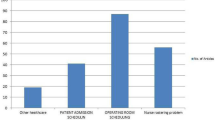Abstract
Managing human resources is crucial in organizations, and this can be best done through optimal workforce scheduling. Workforce scheduling is conducted regularly in transportation, manufacturing, retail stores, academic institutions, and health care units. For the latter, healthcare personnel must be assigned required shifts to satisfy hospital requirements, while optimizing costs and quality of service. In this context, we propose a nature-inspired technique based on the Whale Optimization Algorithm (WOA) for solving the Nurse Scheduling Problem (NSP). More precisely, we have redefined the WOA to deal with this combinatorial problem efficiently. To assess the performance of different variants of our discrete WOA, we conducted several experiments on randomly generated NSP instances. In the experiments, our WOA has been compared with variants of the Branch & Bound (B &B) and the Stochastic Local Search (SLS) algorithms. B &B uses constraint propagation at different levels while SLS starts with an initial configuration obtained with a backtrack search technique. Overall, the results of the comparative experiments demonstrate the superiority of the proposed WOA in terms of quality of the solution returned and the related running time.
Access this chapter
Tax calculation will be finalised at checkout
Purchases are for personal use only
Similar content being viewed by others
References
Baskaran, G., Bargiela, A., Qu, R.: Integer programming: using branch and bound to solve the nurse scheduling problem. In: 2014 International Conference on Artificial Intelligence and Manufacturing Engineering (IIE ICAIME2014) (2014)
Ben Said, A., Mouhoub, M.: A constraint satisfaction problem (CSP) approach for the nurse scheduling problem. In: Symposium Series on Computational Intelligence (2022)
Bidar, M., Mouhoub, M.: Nature-inspired techniques for dynamic constraint satisfaction problems. Oper. Res. Forum 3(2), 1–33 (2022)
Burke, E., Cowling, P., De Causmaecker, P., Berghe, G.V.: A memetic approach to the nurse rostering problem. Appl. Intell. 15(3), 199–214 (2001)
Camacho-Villalón, C.L., Dorigo, M., Stützle, T.: Exposing the grey wolf, moth-flame, whale, firefly, bat, and antlion algorithms: six misleading optimization techniques inspired by bestial metaphors. Int. Trans. Oper. Res. (2022)
Cheng, K.C., Yap, R.H.: An MDD-based generalized arc consistency algorithm for positive and negative table constraints and some global constraints. Constraints 15(2), 265–304 (2010)
Dechter, R., Cohen, D.: Constraint Processing. Morgan Kaufmann, Burlington (2003)
Gutjahr, W.J., Rauner, M.S.: An ACO algorithm for a dynamic regional nurse-scheduling problem in Austria. Comput. Oper. Res. 34(3), 642–666 (2007)
Holland, J.H.: Genetic algorithms. Sci. Am. 267(1), 66–73 (1992)
Jafari, H., Salmasi, N.: Maximizing the nurses’ preferences in nurse scheduling problem: mathematical modeling and a meta-heuristic algorithm. J. Ind. Eng. Int. 11(3), 439–458 (2015)
Jan, A., Yamamoto, M., Ohuchi, A.: Evolutionary algorithms for nurse scheduling problem. In: Proceedings of the 2000 Congress on Evolutionary Computation, CEC00 (Cat. No. 00TH8512), vol. 1, pp. 196–203. IEEE (2000)
Kennedy, J., Eberhart, R.: Particle swarm optimization. In: Proceedings of ICNN 1995 International Conference on Neural Networks, vol. 4, pp. 1942–1948. IEEE (1995)
Larrosa, J.: Node and arc consistency in weighted CSP. In: AAAI/IAAI, pp. 48–53 (2002)
Lecoutre, C., Szymanek, R.: Generalized arc consistency for positive table constraints. In: Benhamou, F. (ed.) CP 2006. LNCS, vol. 4204, pp. 284–298. Springer, Heidelberg (2006). https://doi.org/10.1007/11889205_22
Li, J., Aickelin, U.: A Bayesian optimization algorithm for the nurse scheduling problem. In: The 2003 Congress on Evolutionary Computation, CEC 2003, vol. 3, pp. 2149–2156. IEEE (2003)
Mirjalili, S., Lewis, A.: The whale optimization algorithm. Adv. Eng. Softw. 95, 51–67 (2016)
Mouhoub, M.: Dynamic path consistency for interval-based temporal reasoning. In: Hamza, M.H. (ed.) The 21st IASTED International Multi-conference on Applied Informatics (AI 2003), Innsbruck, Austria, 10–13 February 2003, pp. 393–398. IASTED/ACTA Press (2003)
Mouhoub, M., Sukpan, A.: Conditional and composite temporal CSPs. Appl. Intell. 36(1), 90–107 (2012). https://doi.org/10.1007/s10489-010-0246-z
Rajeswari, M., Amudhavel, J., Pothula, S., Dhavachelvan, P.: Directed bee colony optimization algorithm to solve the nurse rostering problem. Comput. Intell. Neurosci. 2017 (2017)
Russell, S., Norvig, P.: Artificial Intelligence: A Modern Approach. Prentice Hall, Hoboken (2002)
Topaloglu, S.: A multi-objective programming model for scheduling emergency medicine residents. Comput. Ind. Eng. 51(3), 375–388 (2006)
Woeginger, G.J.: Exact algorithms for NP-hard problems: a survey. In: Jünger, M., Reinelt, G., Rinaldi, G. (eds.) Combinatorial Optimization—Eureka, You Shrink! LNCS, vol. 2570, pp. 185–207. Springer, Heidelberg (2003). https://doi.org/10.1007/3-540-36478-1_17
Wu, J., Lin, Y., Zhan, Z., Chen, W., Lin, Y., Chen, J.: An ant colony optimization approach for nurse rostering problem. In: 2013 IEEE International Conference on Systems, Man, and Cybernetics, pp. 1672–1676. IEEE (2013)
Zhang, Z., Hao, Z., Huang, H.: Hybrid swarm-based optimization algorithm of GA & VNS for nurse scheduling problem. In: Liu, B., Chai, C. (eds.) ICICA 2011. LNCS, vol. 7030, pp. 375–382. Springer, Heidelberg (2011). https://doi.org/10.1007/978-3-642-25255-6_48
Author information
Authors and Affiliations
Corresponding author
Editor information
Editors and Affiliations
Rights and permissions
Copyright information
© 2023 The Author(s), under exclusive license to Springer Nature Switzerland AG
About this paper
Cite this paper
Sadeghilalimi, M., Mouhoub, M., Said, A.B. (2023). Solving the Nurse Scheduling Problem Using the Whale Optimization Algorithm. In: Dorronsoro, B., Chicano, F., Danoy, G., Talbi, EG. (eds) Optimization and Learning. OLA 2023. Communications in Computer and Information Science, vol 1824. Springer, Cham. https://doi.org/10.1007/978-3-031-34020-8_5
Download citation
DOI: https://doi.org/10.1007/978-3-031-34020-8_5
Published:
Publisher Name: Springer, Cham
Print ISBN: 978-3-031-34019-2
Online ISBN: 978-3-031-34020-8
eBook Packages: Computer ScienceComputer Science (R0)




